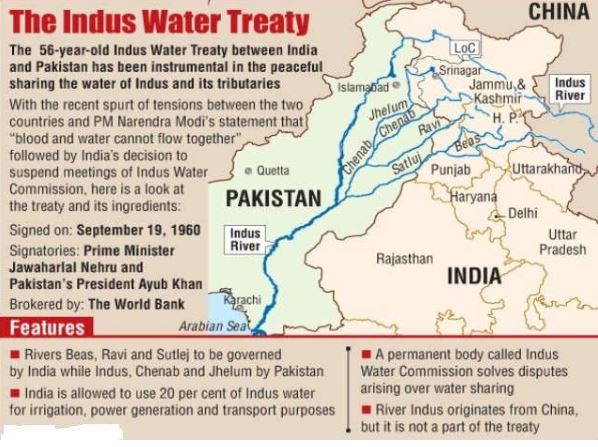- Home
- Prelims
- Mains
- Current Affairs
- Study Materials
- Test Series
 EDITORIALS & ARTICLES
EDITORIALS & ARTICLES
India, Pakistan conclude Indus water talks in cordial atmosphere
The meeting is held annually under the Indus Water Treaty (IWT) 1960.

Indus Water Treaty
In September 1960, the Indus Waters Treaty (IWT) was signed by former Prime Minister Jawaharlal Nehru and then President of Pakistan, Ayub Khan.
Key Provisions of the Treaty
- The treaty prescribed how water from the six rivers of the Indus River System could be shared among India and Pakistan.
- Treaty prescribes sharing of water of 6 rivers:
- Pakistan: Ravi, Beas, Sutlej.
- India : Indus, Chenab, Jhelum.
- Main issue is disbalanced decision as 80% of water goes to Pakistan and rest 20% to India
- Permanent Indus Commission on both sides serving as a forum for exchange of statistics on the rivers, for continued cooperation and as a first stop for resolution of conflicts.
Hydropower Projects
- While Pakistan has rights over the waters of Jhelum, Chenab and Indus, Annexure D permits India to build ‘run of the river’ hydropower projects on these rivers, which means projects not requiring live storage of water.
- It additionally offers certain layout specifications which India has to comply with while developing such projects.
- The treaty also allows Pakistan to raise objections over such projects being constructed by India, if it does not find them to be compliant with the specifications.
- India has to share data at the project layout or alterations made to it with Pakistan, which is required to reply with objections, if any, within 3 months of receipt.
Dispute Resolution Mechanism
- The IWT also offers a 3 step dispute resolution mechanism, under which “questions” on both sides may be resolved at the Permanent Commission, or also can be taken up at the inter-government level.
- In case of unresolved questions or “differences” among the nations on water-sharing, both sides can approach the World Bank to appoint a Neutral Expert (NE) to come to a decision.
- And eventually, if both parties aren''t satisfied with the NE’s decision or in case of “disputes” in the interpretation and volume of the treaty, subjects may be stated at a Court of Arbitration.
Need of IWT Renegotiation
- Every now after which, there''s a clamour in India for abrogating the IWT as a reaction to Pakistan’s cross-border terrorism and intransigence.
- There had been numerous times of terror assaults which can have induced India, in the Vienna Convention on the Law of Treaties, to withdraw from the IWT.
- With abrogation an option that India is hesitant to take, there''s a growing debate to modify the existing IWT.
- While the treaty may have served a few purposes at the time it was signed, now with a new set of hydrological realities, advanced engineering techniques in dam construction and de-siltation, there''s an urgent need to look at it afresh.
Arguments in favour of renegotiation of IWT
- Poor water development projects have allowed 2-3 MAF of water to effortlessly flow into Pakistan which needs to be urgently utilised.
- Further, out of the total expected capacity of 11,406 MW of electricity that can be harnessed from the 3 western rivers in Kashmir, only 3034 MW has been tapped so far.
- However, Article XII of the Treaty says that the agreement can be modified only by a duly ratified treaty concluded for that purpose between the two governments.
- Pakistan will see no benefit in any modification having already got a good deal in 1960.
- India’s best option, therefore, would be to optimise the provisions of the treaty in its present form.
- IWT does not have a unilateral exit provision, and is supposed to remain in force until both the nations ratify another jointly agreed pact.
Road ahead
- The role of India, as an accountable upper riparian abiding by the provisions of the treaty, has been incredible however the country is under pressure to reconsider the extent to which it could continue to be committed to the provisions, as its overall political relations with Pakistan becomes intractable.
- IWT is often stated as an example of the possibilities of peaceful coexistence that exist despite the troubled relationship among both neighbouring countries.









 Latest News
Latest News General Studies
General Studies